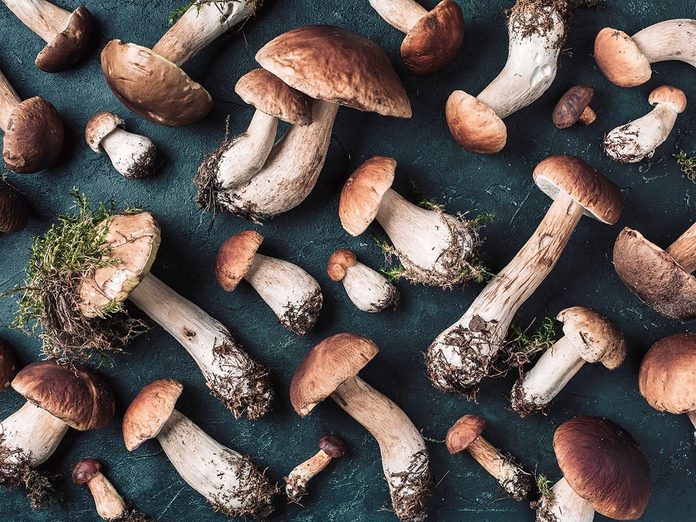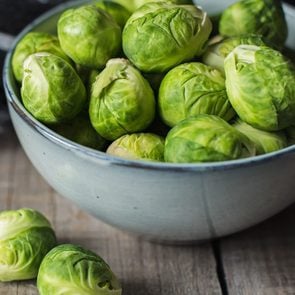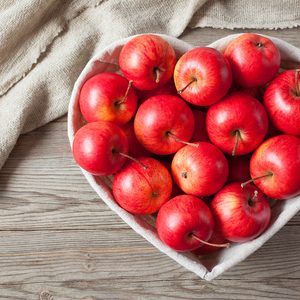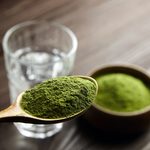These Mushrooms Are Being Touted as the Newest Superfood—Here’s Why

Functional mushrooms are popping up in teas, tinctures and even skin care. A registered dietitian explains the trend.
Distinct in many ways from the grocery store button variety, functional mushrooms have been used as herbal remedies and in daily tonics in Asian cultures for centuries. Now they’ve gone mainstream in North America, showing up in teas, tinctures and skin care. Functional mushrooms primarily grow on trees (versus in the ground) and have known benefits for the human body. Here’s how you can harness their powers for everyday use.
Reishi
Often referred to as the “queen of mushrooms,” reishi were once revered by royalty. Reishi mushrooms contain beta-glucans, a type of complex sugar that may help prevent the growth and spread of cancer cells. A few small studies have shown reishi can counteract the immune suppression caused by some cancer therapies, making them a good complement to treatments like chemotherapy and radiation. Reishi are also thought to produce feelings of relaxation and calm, so they are ideal as a nightcap. Try them in a tea before bed. (Check out more foods that may help prevent cancer.)
Lion’s Mane
Bright, brilliant white lion’s mane mushrooms get their name from their stringy, hair-like appearance. Touted for their neurological benefits, lion’s manes are thought to improve the mild impairment of cognitive function, including memory and thinking skills in older adults, and may help reduce mild symptoms of depression and anxiety. Lion’s mane also seems to protect the mucous membrane layer of the stomach, which can improve symptoms related to long-term inflammation of the stomach lining, like gastritis or stomach ulcers. Usually taken as a powder or capsule, lion’s mane is great as a caffeine substitute, as it can get your brain firing and improve your productivity—without the jitters. (Want to increase your daily intake of mushrooms? Try this tasty mushroom toast recipe.)
Chaga
Chaga mushrooms grow on birch trees and thrive in cold climates, like northern Canada, Siberia and northern Japan. Chaga look much different than other fungi because of their dark charcoal colour and coal-like shape. These fungi are high in antioxidants and have antimicrobial properties. Laboratory and animal studies show that compounds in chaga can kill cancer cells and stimulate the immune system. We’re just catching on to the chaga mushroom’s healing properties, but it’s been used as part of traditional medicine in Canadian Indigenous communities for generations. The mushrooms are typically ground into a powder and consumed as a tea or tincture. Have the drink as a daily tonic to protect against free radical damage and fend off infections. Because chaga is anti-inflammatory, it can also have positive skin effects and has popped up in skin-care products to soothe irritation and combat signs of aging. (Find out 11 more surprising things that can slow down aging.)
Cordyceps
Cordyceps are a unique type of parasitic fungus that grows out of the larvae of insects. The mushroom attacks the host and sprouts long, finger-like stems on the outside. Despite their aggressive tendencies, cordyceps are friend, not foe. Cordyceps have been a fixture in Chinese and Tibetan medicine for centuries and are sometimes referred to as “Himalayan Gold” for their reported performance-enhancing properties, like improving muscle endurance and sexual function. This effect occurs because cordyceps increase smooth muscle relaxation, which boosts blood flow to muscles and organs. Cordyceps are ideal for when you want to feel energized. Try them in a morning smoothie or drink to power through a workout or to conquer whatever else is on your to-do list for the day. (Discover more foods that can help improve circulation.)
The beauty of functional mushrooms is that they are intended for daily use, helping you adapt to whatever life throws your way. Whether you’re trying to find a moment of calm or looking for a way to support your immunity, multipurpose mushrooms are here to help.
Laura Jeha is a Registered Dietitian, nutrition counsellor, recipe developer and food writer living in Toronto. Find out more at ahealthyappetite.ca.
Next, check out the 50 best foods for your heart.






